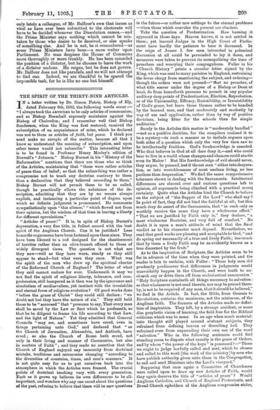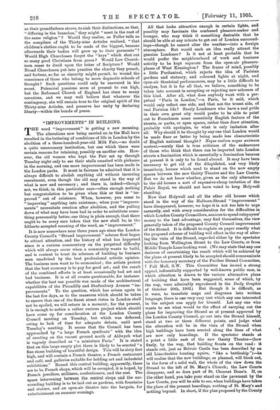I N a letter written by Dr. Simon Pattie, Bishop of
Ely, dated February 8th, 1682, the following words occur :— " I always took the almoLas to be only articles of communion; and so Bishop Bra mhall expressly maintains against the Bishop of Chalcedon ; and I remember well that Bishop Sanderson, when the King was first restored, received the subscription of an acquaintance of mine, which he declared was not to them as articles of faith; but peace. I think you need make no scruple of the matter, because all that I know so understand the meaning of subscription, and upon other terms would not subscribe." This interesting letter is to be found in Professor Henry Morley's edition of Boswell's "Johnson." Bishop Burnet in his " History of the Reformation" mentions that there are those who so think of the Articles, maintaining that "these were rather articles of peace than of belief ; so that the subscribing was rather a compromise not to teach any doctrine contrary to them than a declaration that they believed according to them." Bishop Burnet will not permit them to be so called, though he practically allows the substance of the de- scription, admitting that they are by no means always explicit, and instancing a particular point of dogma upon which no definite judgment is pronounced. He comments sympathetically. upon "this silence," " which flowed not from their opinion, but the wisdom of that time in leaving a liberty for, different speculations."
"Articles of peace !" It is, in spite of Bishop Burnet's deprecation, a very fine title, in fullest accord with the best spirit of the Anglican Church. Can it be justified? Less honorific cognomens have been fastened upon them since. They have been likened to a rod designed for the chastisement of heretics rather than an olive-branch offered to those of widely divergent views. The question is not what are they now—well as they have worn, steady as they still appear to stand—but what were they once. What was the spirit of the men who drew up the spiritual charter of the Reformed Church of England ? The letter of what they said cannot endure for ever. Underneath it may we not, find the spirit of religious liberty, tolerance, and corn- prehension, still hampered as it then was by the ignorance and absolutism of mediaevalism, yet instinct with the irresistible and eternal force of religious evolution? Of good works done " before the grace of Christ " they could still declare : " we doubt not but they have the nature of sin." They still held those to be " accursed" that " presume to say, That every man shall be saved by the Law or Sect which he professeth, so that he be diligent to frame his life according to that Law, and the light of Nature." Yet they admitted that General Councils " may err, and. sometimes have erred, even in things • pertaining unto God," and declared that " as the Church of Jerusalem, Alexandria, and Antioch, have erred ; so also the Church of Rome hath erred, not only in their living and manner of Ceremonies, but also in matters of Faith" ; and they made no assertion that the Church of England enjoyed any immunity from doctrinal mistake, traditions and ceremonies changing "according to the diversities of countries, times, and men's manners." It is not quite easy for us to put ourselves back into the atmosphere in which the Articles were framed. The crucial points of doctrinal teaching vary with every generation. Each as it grows up believes its own differences to be all- important, and wonders why any one cared about the questions of the past, refusing to believe that there will be new questions
Take the question of Predestination. How burning it appeared in those days. Heaven knows, it is not settled in
these; yet learned Judges in the High Court of Parlia-
ment have hardly the patience to hear it discussed. In the reign of James I. few men interested in polemical discussion at all could be persuaded to lay it down, and measures were taken to prevent its monopolising the time of preachers and wearying their congregations. Fuller in his "Church History" prints a circular letter signed by the
Sing, which was sent to many parishes in England, restraining the lower clergy from mentioning the subject, and ordering—
though the orders were not pressed—" that no preacher, of what title soever under the degree of a Bishop or Dean at least, do from henceforth presume to preach in any popular auditory deep points of Predestination, Election, Reprobation, or of the Universality, Efficacy, Resistibility, or Irresistibility of God's grace, but leave those themes rather to be handled by the learned men, and that moderately and modestly by way of use and application, rather than by way of positive doctrines, being fitter for the schools than for simple auditories."
Surely in the Articles this matter is " moderately handled " not as a positive doctrine, for the compilers realised it to be a mystery—in such a manner as to include arguers upon both sides of a question which only the very few then saw to be intellectually fruitless. God's foreknowledge is asserted.
Who that believes in God at all dare deny it,—and who could bear to live in a world whose changes and chances could startle even its Maker ! But His foreknowledge of evil should never, they argue, be pressed, lest it thrust men " either into despera- tion, or into wretchlessness of most unclean living, no less perilous than desperation." We find the same comprehensive tolerance shown in dealing with the Sacraments. Intellectual differences are slurred over and curious questions left to opinion, all arguments being clinched with a practical moral certainty. Quite what the Articles bind the Church to believe on the subject of "the Supper of the Lord" who shall say? In point of fact, they did not bind the faithful at all; but this much they do assert of the Sacraments, that " in such only as worthily receive the same they have a wholesome effect." " That we are justified by Faith only is," they declare, " a most wholesome Doctrine, and very full of comfort." No doubt it is upon a man's attitude of mind that the final verdict as to his character must depend. Nevertheless, we read that good works are pleasing and acceptable to God, " and do spring out necessarily of a true and lively Faith; insomuch that by them a lively Faith may be as evidently known as a tree discerned by the fruit." As to the inspiration of Scripture, the Articles seem to be far in advance of the time when they were printed, and the reader is fain to exclaim, with Fuller : " These holy men did prudently prediscover that differences in judgments would unavoidably happen in the Church, and were loath to un- church any or drive them off from ecclesiastical communion." " Holy Scripture containeth all things necessary to salvation : so that whatsoever is not read therein, nor may be proved there- by, is not to be required of any man, that it should be believed," we find in the Article. In fact, the Bible, from Genesis to Revelations, contains the maximum, not the minimum, of the Anglican faith. The framers of the Articles made no defini- tion of inspiration. They left, by a strange accident, or some dim prophetic vision of learning, the field free for the Biblical criticism which was to come. In an age when much material- istic thought still played around abstract subjects, they refrained from defining heaven or describing hell. They refrained even from expounding their own use of the word "salvation." Who in the following sentences could find standing room to dispute what exactly is the grace of Orders, and by whom " the power of the keys " is possessed ?—" Those we ought to judge lawfully called and sent, which be chosen and called to this work [the work of the ministry] by men who have publiek authority given unto them in the Congregation, to call and send Ministers into the Lord's vineyard."
Supposing that once again a Committee of Churchmen were called upon to draw up new Articles of Faith, would they again deserve the title of " articles of peace" ? Would Anglican Catholics, and Church of England Protestants, and Broad Church upholders of the Anglican compromise strive,
as their grandfathers strove, to sink their distinctions, so that, " differing in the branches," they might " meet in the root of the same religion " P Would they realise, as Fuller tells us the compilers of the Thirty-nine Articles realised, " that children's clothes ought to be made of the biggest, because afterwards their bodies will grow up to their garments " ? Would High Churchmen forget the " keys " which shut out so many good Christians from grace ? Would Low Church- men cease to dwell upon the letter of Scripture P Would Broad Churchmen put into practice the charity they preach, and forbear, so far as sincerity might permit, to wound the conscience of those who belong to more dogmatic schools of thought P Such questions could only be answered in the event. Polemical passions seem at present to run high, but the Reformed Church of England has risen to many oocasions, and we may well believe that whatever the contingency, she will remain true to the original spirit of the Thirty-nine Articles, and preserve her unity by declaring liberty—within the bonds of peace.







































 Previous page
Previous page